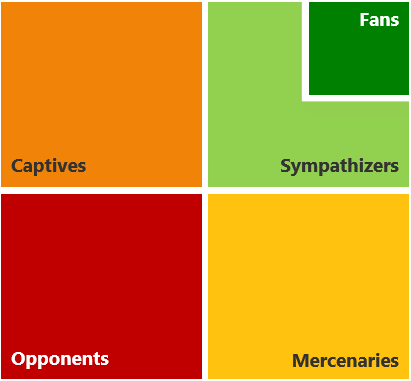Your Path to Success
What is FANOMICS?
FANOMICS is a comprehensive management program that helps companies analyze their internal and external relationships, align them with customer value, and thereby significantly increase their business success.
With FANOMICS we provide you with clarity about the satisfaction levels and the emotional loyalty of your target groups. We help you focus upon your strengths, use your resources optimally and steer your organization successfully.
With FANOMICS, we assist you in aligning your customer and employee relationships on the basis of fan relationships: through Identification and Perceived Uniqueness. The bestseller authors Roman Becker and Prof. Dr. Gregor Daschmann have derived these two fan characteristics from social sciences and successfully applied them to companies in their management bestseller “The Fan Principle”.
Explanation
Fan Customers as Drivers of Growth
Increase Your Fan Rate – Increase Your Profit!
If businesses want to increase their returns, cutting costs and making workflows more efficient cannot be the only measures. Instead, growth must come by discovering and opening additional sales opportunities.
Successful businesses either increase their market share within the target groups they have already tapped (i.e. achieve greater penetration of the existing market), or tap into new markets – either by gaining new customer segments or by expanding the product range (sometimes both at the same time).
All growth strategies are only efficient and successful when used with fan customers.
Read here how fans help your growth:
The Fan Portfolio
Who is a Fan And Who is Not?

In the Fan Portfolio, we segment the target groups according to their emotional loyalty and performance satisfaction. In this way, we identify a total of five customer types that have different satisfaction levels as well as emotional attachments: Fans, Sympathizers, Mercenaries, Captives and Opponents.
Fan: High satisfaction, with above-average emotional loyalty. Loyal partner and ambassador.
Sympathizer: Similar in satisfaction and emotional loyalty to the fan; but less committed.
Mercenary: High satisfaction; yet without emotional loyalty. Performance-based (strongly price-oriented).
Captive: Dissatisfied; yet emotionally loyal. For example, disappointed when information is missing or the performance promise is no longer fulfilled.
Opponents: Dissatisfied and low emotional loyalty. Please note: Opponents often make their displeasure known publicly and speak poorly about the company.
The Fan Indicator
How Do We Measure “Fandom”?
20+ years of in-depth research and business consulting underpin the following: Customer satisfaction is not sufficient as the sole indicator and control variable for relationship quality. Even highly satisfied customers are increasingly behaving in a disloyal fashion. Another meaningful key performance indicator (KPI) is necessary to assess the quality of business relationships properly.
Social science fan research specifies: fans have a high-value emotional bond with their “star.” The classic correlations of satisfaction through mere performance do not apply here. What creates a fan is a “fit” intuitively felt by the fan between them and what the star has to offer. This “fit” creates a sense of identification. Identification is a major driving force for every fan relationship.
And: The fan wants repetition. Fans want to feel (over and over again) that which once made them a fan.
To this end, Identification needs to be experienced repeatedly. This creates a distinct Perceived Uniqueness.
The prerequisites for any emotional loyalty are rooted within the fan indicator and can be transferred to the relationships experienced between companies and their customers:
Identification
Perceived fit between the customer needs and the company offerPerceived Uniqueness
To the customer, the company is the most attractive provider in its field.Fan Indicator
Emotional loyalty in relationships is easily measurable. If a customer feels a high degree of identification and if, from their point of view, their provider is deemed unique, the customer will be loyal. With the fan indicator and the fan rate (which is calculated with help of the fan indicator), we have developed a fundamentally sound KPI for understanding the quality of relationships.
Our Benefits
For Your Success

Contact:
Jonas Lang
Member of the Executive Board, Head of Sales

